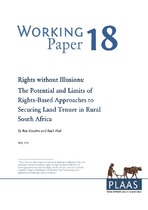Rights without illusions: The potential and limits of rights-based approaches to securing land tenure in rural South Africa
Abstract
Summarising the trajectory of tenure policy and law making from 1994 through to the present, the paper shows how discourses of rights, citizenship and democracy shape policies and legislation. We assess the policies and outcomes, and argue that the degree to which legally defined rights to land have been realised in practice depends in large part on the outcome of local-level struggles within shifting relations of power. Local arenas are not, however, hermetically sealed off from wider power relations, discourses and institutional contexts (including those of law and policy) which mediate the operation of power. This means that the impacts of land rights defined in law can be direct and indirect, material and symbolic. Inadequate state capacity for implementing law and policy, and the nature of structural poverty in rural South Africa (which tends to weaken the substantive content of rights) constrain the direct impact of law and policy. Nevertheless, a focus on rights can help defend people from dispossession, open political space for mobilisation, provide a grounded critique of unjust social orders and help articulate a vision of an alternative social order (Cousins 2009). Although inherently limited in their systemic impacts, rights in law are a potentially useful ‘weapon of the weak’3, along with other strategies, and should not be abandoned. Following Hunt (1991: 248), we term this a ‘rights-without-illusions’ approach, which can inform mobilisation, advocacy, litigation and research in relation to land tenure reform.

